A Quote by RM
In 2014, I knew my English was not so bad, but I had no confidence in talking directly to an English-speaking reporter. I had to do a short interview with, I think, Reuters from France. I was so nervous. I practiced memorizing three sentences for two hours. But, I think that these kinds of interviews make me develop a lot, and that helps me.
Related Quotes
I had the advantage, that I know Swedish. So I had the Swedish book and I had a lot of English translations, and German translations, and I did everything to make the best English translation of August Strindberg's Miss Julie I could. And then, there I went. "Oh! I think she's thinking this, but I think she should say it!" And so on. It's wonderful to do that.
You know, I was a kid who had difficulty speaking English when I first immigrated. But in my head, when I read a book, I spoke English perfectly. No one could correct my Spanish. And I think that I retreated to books as a way, you know, to be, like, masterful in a language that was really difficult for me for many years.
I think I succeeded as a writer because I did not come out of an English department. I used to write in the chemistry department. And I wrote some good stuff. If I had been in the English department, the prof would have looked at my short stories, congratulated me on my talent, and then showed me how Joyce or Hemingway handled the same elements of the short story. The prof would have placed me in competition with the greatest writers of all time, and that would have ended my writing career.
I'd studied English literature and American history, but the English literature, which I thought was going to be helpful to me in an immediate way, was the opposite. So I had to un-think a lot of things and move out of my own head, and I learned a lot. It was like graduate school, but an un-graduate school or an un-school.
The biggest issue for me has been the language because I speak so much German now. I've had to focus on my English and find more words to describe what I want to say and also soften my tone. It was quite stiff from 20 years of speaking German, so when I started speaking more English, oh my god, my tongue was like: 'Argh'!
I remember reading 'The Grapes of Wrath' in high school in 1983. My family had immigrated to the U.S. three years before, and I had spent the better part of the first two years learning English. John Steinbeck's book was the first book I read in English where I had an 'Aha!' moment, namely in the famed turtle chapter.



































